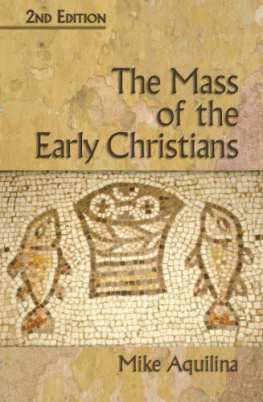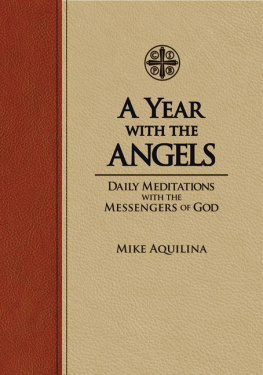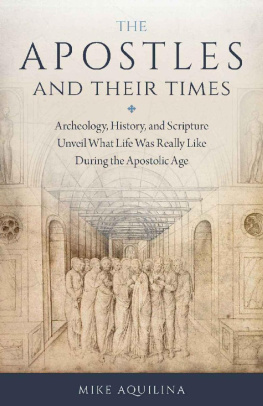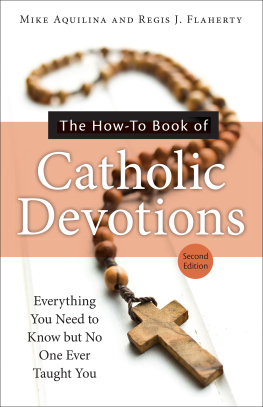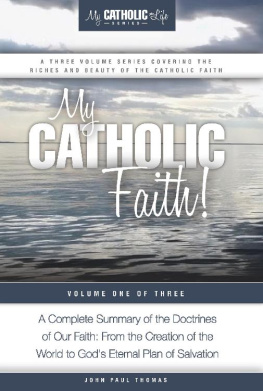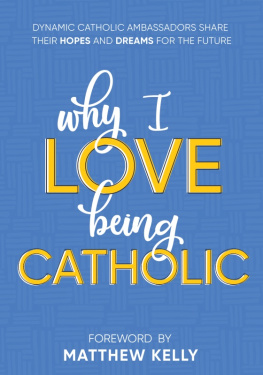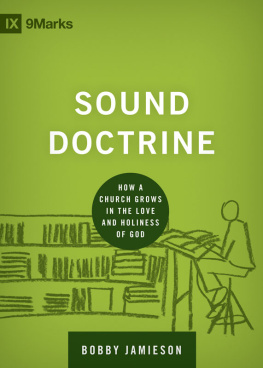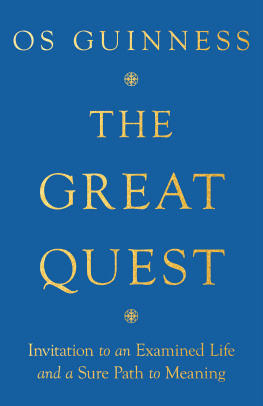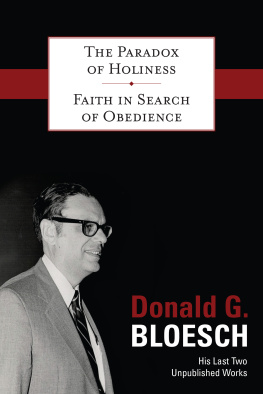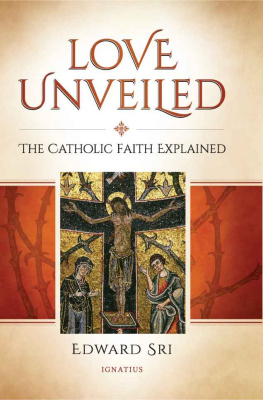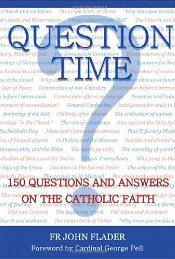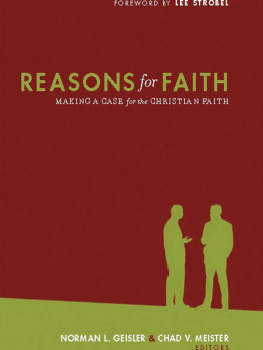
Emmaus Road Publishing
827 North Fourth Street
Steubenville, Ohio 43952
2005 by Michael J. Aquilina
and Kenneth M. Ogorek
All rights reserved. Published 2005
Printed in the United States of America
09 08 07 06 05 1 2 3
Library of Congress Control Number: 2005938651
ISBN: 2005935490
Unless otherwise indicated, Scripture quotations are taken from
the Revised Standard Version, Catholic Edition (RSV-CE)
1965, 1966 by the Division of Christian Education of the
National Council of the Churches of Christ in the
United States of America. Used by permission
Cover design by
Michael Andaloro
Editorial assistance by
Christopher Bailey and C. T. Maier
THE GREAT LIFE
Essays on Doctrine and Holiness
Table of Contents
Bishop Donald W. Wuerl
Michael Aquilina
Kenneth Ogorek
Archbishop Charles Chaput, O.F.M. Cap.
Archbishop Sen OMalley, O.F.M. Cap.
Father Thomas Weinandy, O.F.M. Cap.
Katrina Zeno
Russell Shaw
Scott Hahn
Janet and J. Brian Benestad
Robert P. George
Gerard V. Bradley
William E. May
Evelyn and John Billings
Father Augustine J. DiNoia, O.P.
Father Kris Stubna
Patrick G. D. Riley
William Saunders
Father Ronald Lawler, O.F.M. Cap.
Robert Lockwood
Foreword
B ISHOP D ONALD W. W UERL
I t is a privilege to offer these words of introduction to the Festschrift honoring Father Ronald Lawler, O.F.M. Cap. This is particularly so because I had the great joy not only of working with Father Ronald on many projects over nearly forty years but also of having him as a spiritual director and guide for a substantial part of that time.
Two of the most endearing qualities of Father Ronald were the sharpness of his mind and the gentleness of his heart. He combined the best of intellect and will and did so clothed in all the humility and detachment of a son of Saint Francis. Everyone who knew Father Ronald knew that he was a gentle and skilled teacher. He understood his priesthood as an extension of Christs voice proclaiming the Lords way through life.
The Church in her liturgy and pastoral office speaks of the threefold task of the priest: to teach, to lead, and to sanctify. While he understood and embraced all of the aspects of priesthood, Father Ronald shone his brightest as he exercised the munus docendi (office of teaching). In recognition of that quality of his life and ministry I want to reflect on the role of the priest as teacher of the Faith.
At different times, one aspect of this threefold ministry has received more emphasis than the others. Not long ago priesthood was depicted almost entirely in terms of sacramental ministry and, specifically, the celebration of the Eucharist. The priest as steward of the sacred mysteries (cf. 1 Cor. 4:1) was recognizable at the altar, in anointing the sick, in the confessional, or in preparing people for the sacraments, especially Matrimony.
In the early years of the Church in our own country, the leadership role of the priest was particularly important. He was the recognized leader and spokesman for the faithfulmany of whom had only recently come to this land. While clearly the steward of the mysteries of Christ, the priest was also the leader of Gods people as their builder, guide, organizer, and counselor.
The leadership and sanctifying roles of the priest certainly continue, even though they may find expression in an expanded context. Nonetheless, today, there is a need to focus on the priests prophetic ministrythe task of proclaiming the call to faith in God, to life in His name, and to the kingdom to come.
The need for catechetical renewal in our country highlights the imperative of a more explicit teaching of the Faith. We refer to the lost generation, religious illiteracy, and catechetical deficiencies as a way of expressing the diminished level of intellectual awareness of and personal loyalty to the revealed teaching of Christ and its application that we refer to as the received Tradition.
The faithful who sit in the pews around us at Sunday Mass have not all had the advantage of continuous religious instruction as they grew and developed intellectually and spiritually. Today, the majority of the generation passing on the Faith to their own children did not themselves learn of it from the consecrated women and men who were once so prominent in Catholic schools. They may have had only sporadic, superficial instruction in the Faith leaving them with little foundation for addressing the issues of life, including lifes purpose for themselves and their children.
At the same time, we see a disintegration of those community and social structures that once supported religious faith and encouraged family life. The heavy emphasis on the individual and his or her rights has greatly eroded the concept of the common good and its ability to call people to something beyond them. When the individual is the starting point, there is a diminished awareness of the intrinsic value of others and even a temptation to see others as objects or means to an end. In this setting, their value is determined only by what they can do for me.
We experience this in our society and in the law, for example, when one persons right to life falls victim to another persons right to privacy. This conflict impacts strongly on the capacity of some to accept a teaching that is revealed by God and not decided by democratic vote, or to follow an absolute moral imperative despite its inconvenience or unpopularity.
When we hear the claim that a number of Catholics do not accept the Churchs teaching, whether on abortion, euthanasia, capital punishment, marriage, sexuality, racism, societal care for the poor, or some other moral issue, we need continually to remind ourselves that there is a clearly articulated body of Catholic teaching. At the same time, we need to recall that the Faith is not forced on anyone. It must be freely embraced and generously lived. This can only happen if there is someone to proclaim fully, clearly, and convincingly Gods word and the teaching of Christ. A part of bringing Jesus into our lives includes acceptance of the teaching of Christs Church as the voice of Christ Himself. He who hears you, Jesus said to His apostles, hears me (Lk. 10:16).
In his preaching and teaching, the priest needs to be the countercultural voice, as Father Ronald was, that offers sound and sure answers to lifes questions. These responses derive from the Churchs Traditionthe millennia of reflection on the human condition under the guidance of the Holy Spirit. While these responses may not always be popular, they are true. They lead us to God. Like John the Baptist who pointed and proclaimed Behold the Lamb of God (Jn. 1:29), so the priest needs to point to Christ, His way, His teaching, His Gospel in a world that all-too-readily does not see Him in the midst of all the other alternatives.
Today we often encounter young parents who, when called to be the first teachers of their children in the ways of the Faith, experience their own first serious personal catechesis as they share in the catechetical programs for their children. While this is far from the ideal, let us not lament but accept this as a second chance for both them and us.


